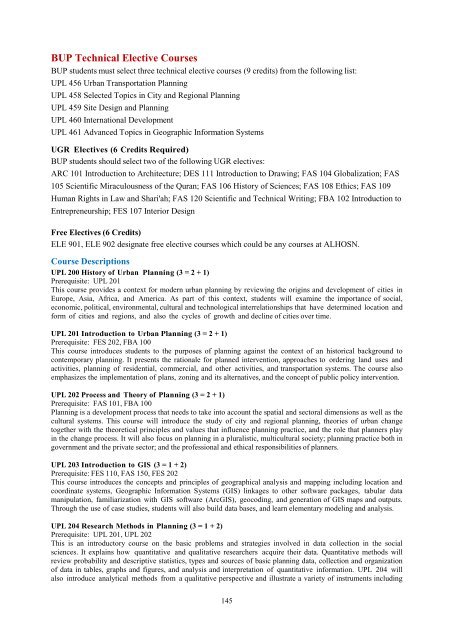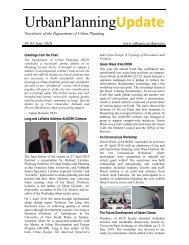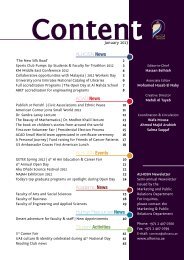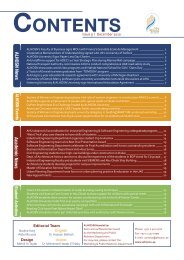ALHOSN University Catalogue Global Knowledge with Local Vision ...
ALHOSN University Catalogue Global Knowledge with Local Vision ...
ALHOSN University Catalogue Global Knowledge with Local Vision ...
Create successful ePaper yourself
Turn your PDF publications into a flip-book with our unique Google optimized e-Paper software.
BUP Technical Elective Courses<br />
BUP students must select three technical elective courses (9 credits) from the following list:<br />
UPL 456 Urban Transportation Planning<br />
UPL 458 Selected Topics in City and Regional Planning<br />
UPL 459 Site Design and Planning<br />
UPL 460 International Development<br />
UPL 461 Advanced Topics in Geographic Information Systems<br />
UGR Electives (6 Credits Required)<br />
BUP students should select two of the following UGR electives:<br />
ARC 101 Introduction to Architecture; DES 111 Introduction to Drawing; FAS 104 <strong>Global</strong>ization; FAS<br />
105 Scientific Miraculousness of the Quran; FAS 106 History of Sciences; FAS 108 Ethics; FAS 109<br />
Human Rights in Law and Shari'ah; FAS 120 Scientific and Technical Writing; FBA 102 Introduction to<br />
Entrepreneurship; FES 107 Interior Design<br />
Free Electives (6 Credits)<br />
ELE 901, ELE 902 designate free elective courses which could be any courses at <strong>ALHOSN</strong>.<br />
Course Descriptions<br />
UPL 200 History of Urban Planning (3 = 2 + 1)<br />
Prerequisite: UPL 201<br />
This course provides a context for modern urban planning by reviewing the origins and development of cities in<br />
Europe, Asia, Africa, and America. As part of this context, students will examine the importance of social,<br />
economic, political, environmental, cultural and technological interrelationships that have determined location and<br />
form of cities and regions, and also the cycles of growth and decline of cities over time.<br />
UPL 201 Introduction to Urban Planning (3 = 2 + 1)<br />
Prerequisite: FES 202, FBA 100<br />
This course introduces students to the purposes of planning against the context of an historical background to<br />
contemporary planning. It presents the rationale for planned intervention, approaches to ordering land uses and<br />
activities, planning of residential, commercial, and other activities, and transportation systems. The course also<br />
emphasizes the implementation of plans, zoning and its alternatives, and the concept of public policy intervention.<br />
UPL 202 Process and Theory of Planning (3 = 2 + 1)<br />
Prerequisite: FAS 101, FBA 100<br />
Planning is a development process that needs to take into account the spatial and sectoral dimensions as well as the<br />
cultural systems. This course will introduce the study of city and regional planning, theories of urban change<br />
together <strong>with</strong> the theoretical principles and values that influence planning practice, and the role that planners play<br />
in the change process. It will also focus on planning in a pluralistic, multicultural society; planning practice both in<br />
government and the private sector; and the professional and ethical responsibilities of planners.<br />
UPL 203 Introduction to GIS (3 = 1 + 2)<br />
Prerequisite: FES 110, FAS 150, FES 202<br />
This course introduces the concepts and principles of geographical analysis and mapping including location and<br />
coordinate systems, Geographic Information Systems (GIS) linkages to other software packages, tabular data<br />
manipulation, familiarization <strong>with</strong> GIS software (ArcGIS), geocoding, and generation of GIS maps and outputs.<br />
Through the use of case studies, students will also build data bases, and learn elementary modeling and analysis.<br />
UPL 204 Research Methods in Planning (3 = 1 + 2)<br />
Prerequisite: UPL 201, UPL 202<br />
This is an introductory course on the basic problems and strategies involved in data collection in the social<br />
sciences. It explains how quantitative and qualitative researchers acquire their data. Quantitative methods will<br />
review probability and descriptive statistics, types and sources of basic planning data, collection and organization<br />
of data in tables, graphs and figures, and analysis and interpretation of quantitative information. UPL 204 will<br />
also introduce analytical methods from a qualitative perspective and illustrate a variety of instruments including<br />
145
















